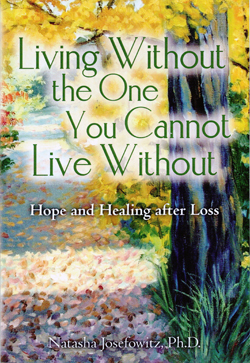LA JOLLA, California–This is part two of a five-part series, The Seven States of Loss and Healing. The poems are excerpted from my book, Living Without the One You Cannot Live Without: Hope and Healing after Loss.
Shock
Give me a sign
blow out the candle
rustle the curtain
make a sound in the wind
touch my cheek
with a breath of air
give me a sign
so I will know
you are here
somewhere with me
please let me feel you
in the room
in the air
in the energy
pulsating in the universe
my love
where are you?
The first state right after the wife or husband dies is “Shock.” Even if the death has been anticipated, the end of a life is jarring. During shock you fluctuate between unbearable emotional pain and the need to be rational and logical in order to deal with practical concerns such as funeral arrangements. Facing the reality of what needs to be taken care of pulls you away from the flow of tears and acts as a respite until a hug or display of sympathy causes you to break down again.
I strongly suggest you have everything in place before there is even an illness. My husband and I had picked our gravesites, written each other’s obituaries, and made lists of the newspapers, schools, and organizations to be notified. We had even chosen the music to be played and the caterer for the meal after the service. Everything was paid for, all I had to do was show up.
Numbness
Ever since he died
I have felt tired
I wake up tired
I may have a bit of energy
during the day
but then I’m exhausted
afterward
I have become a person
who drags her feet
pushes herself out of an armchair
with a sigh
I walk slower,
think slower,
and everything matters less—
the way I look,
what clothes I wear,
whether I need a haircut,
I am also more forgetful
I have to keep checking
my calendar
lest I forget to go somewhere
or do something I’ve promised to do
I forget who just asked me a question
or what that question was
I walk into a room
and wonder why I’m there
I mix up names and faces
and worry whether
I’m losing my mind
I wonder whether I have MCI
“mild cognitive impairment”
but maybe it’s not even
“mild” anymore
yes, I’m more tired and forgetful
than I was a year ago
After shock comes the second state: “Numbness.” People say, “I feel nothing,” “I feel like a ghost,” “I walk around like a zombie.” I suspect this lack of affect is the brain’s way of protecting against intense and disabling pain, waiting for things to get settled a bit. What often makes this such a difficult time is that it is also the period when there are papers to fill out and sign, decisions to be made, transfers of titles, financial questions, etc. Friends and relatives who were there for the funeral are still around. For some the company is a solace, for others a burden. This is a time when you need a trusted lawyer, accountant, and someone to deal with the paperwork.
There is a reason common wisdom dictates that we should not make major decisions too quickly after a loss. In this state, judgment can be impaired, and we may even be making choices by refusing to choose. Behavioral symptoms can include lethargy and exhaustion, but also anxiety and agitation, not crying at all or sobbing uncontrollably. The immune system may be weakened after loss—so taking care of yourself by getting enough sleep and eating regularly becomes even more important.
*
Natasha Josefowitz is an author and freelance writer. This article appeared originally in La Jolla Village News. Natasha may be contacted via natasha.josefowitz@sdjewishworld.com

Natasha,
I don’t know if you remember me. We met going to Don’s home last spring. I’m very excited about seeing you Monday night, October 20th!
Much love
Eva